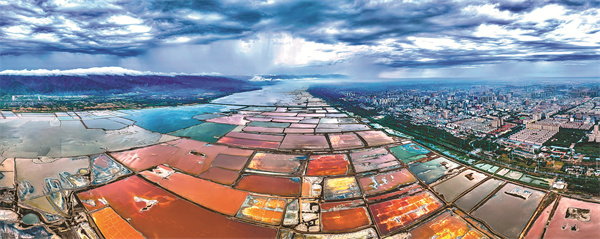
Yuncheng Salt Lake transforms into different colors in early September, resembling a huge painter's palette. [Photo provided to China Daily]
Yuncheng in southwestern Shanxi to host thousands of people in tribute to heroic deity Guan Gong
The 36th Guan Gong Cultural Tourism Festival is scheduled to be held from Tuesday to Thursday in Guan Gong's hometown of Yuncheng. Thousands of domestic and international devotees are expected to take part in the event in this southwestern Shanxi city.
According to organizers of the event, the festival aims to pass on the culture of Guan Gong and promote local economic development.
Guan Gong — which means Lord Guan — is the reverent term of address for Guan Yu, a general in the period spanning the late Eastern Han Dynasty (25-220) and the Three Kingdoms (220-280). He is also known as Guandi, or Emperor Guan.
In Chinese folklore, Guan Gong is a revered figure and a superhero in the eyes of the Chinese people.
His legacy of loyalty, integrity, mercy and bravery — as depicted in China's classic novel Romance of the Three Kingdoms — has earned him deity status in traditional Chinese culture.
Guan was one of the most prominent generals of his time serving under the warlord Liu Bei. He played a significant role in the civil war that led to the collapse of the Eastern Han Dynasty and the establishment of Shu Han (one of the Three Kingdoms), of which Liu was the first emperor.
Liu was said to be a descendant of the Han royal family and his state Shu Han was regarded as the legitimate extension of the previous dynasty. This confirmed Guan was a warrior for a righteous cause and distinguished him from other generals at that time.
The cult of Guan grew during the Tang Dynasty (618-907), and his status reached new heights during the Song Dynasty (960-1279). Emperor Huizong of Song, who was also a devoted Taoist, was the first ruler to make Guan a "deity" in the official Taoist canon. The founder of the Ming Dynasty (1368-1644), Zhu Yuanzhang, later gave him the higher title of " (heavenly) emperor".
More honors followed and his prestige was later recognized by all the major beliefs in China: Confucianism, Buddhism and Taoism.
To Confucians, he is a "military sage"; to Taoists, he is the "Holy Ruler Deity Guan"; and to Buddhists, he is the "Sangharama Bodhisattva".
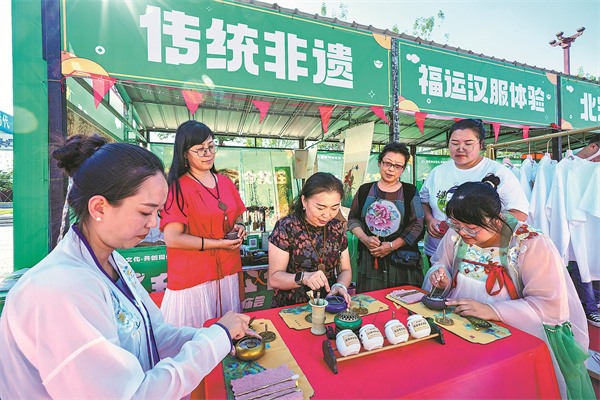
Tourists take part in an intangible cultural heritage workshop during the event in 2023. [Photo provided to China Daily]
He is also regarded as a "god of fortune" by businesspeople and a "god for all" by the general public.
The status has led to nationwide worship of Guan and his many virtues have been praised.
He is among the most popular deities in China and in overseas Chinese communities. It is said there are more than 30,000 Guan Gong temples across China and more than 160 foreign countries and regions.
A statue of Guan Gong can often be found in shops and restaurants owned by overseas Chinese, with burning incense and candles surrounded with fruit as offerings.
However, residents in today's Shanxi, especially in Guan's hometown Yuncheng, are among the most faithful believers.
Among the countless temples of Guan Gong across the world, the one in Haizhou township of Yuncheng, where Guan was born, is the most typical, the largest, best preserved and most skillfully constructed.
Historical records said that the Haizhou Guandi Temple was first built in the Sui Dynasty (581-618). After several renovations, the main structures that have been preserved were built in the Qing Dynasty (1644-1911).
The temple was listed as a key national cultural relic protection unit in 1988 and recognized as a national 4A-class scenic spot in 2005.
The temple is the main venue for the annual Guan Gong Cultural Tourism Festival. Yuncheng has held 35 sessions of the festival, attracting people from throughout the nation and across the world to pay homage.
The first session of the event was held in 1990, when it was called the Guan Gong Temple Fair.
"From a temple fair to a cultural tourism festival, the event has effectively promoted the influence of Yuncheng as the hometown of Guan Gong," said an official in charge of the organization of this year's event. "It has evolved into a comprehensive platform to promote local culture and tourism industries as well as economic and trade cooperation." To promote local culture, many shows will be staged during this year's festival. The local Puju Opera featuring the stories of Guan Gong will be the highlight of the shows.
Puju Opera, also called Puzhou Bangzi, is a local opera form popular in the city of Yuncheng and its neighboring areas in Shanxi and Shaanxi provinces. With a history dating back to the Song Dynasty, Puju Opera is sometimes referred to as the "living fossil of China's opera art".
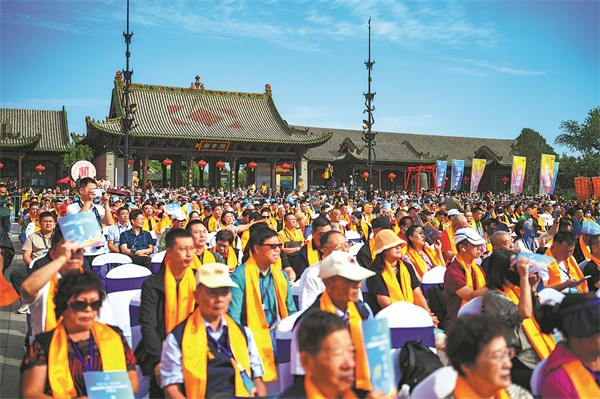
Visitors attend a ceremony to pay homage to Guan Gong during the 2024 festival. [Photo provided to China Daily]
In addition to the festival's main venue of Haizhou township, many areas in Yuncheng city will hold Puju Opera shows, over a period of about two weeks starting from Friday.
A food festival will also be held during the event. Visitors will have a chance to taste local delicacies, especially those made from wheat flour.
On the sidelines of the festival, visitors will have an opportunity to tour local attractions to see the city's natural and cultural wonders.
The city is an ideal place for history enthusiasts to explore one of the sources of Chinese history.
The most famous archaeological site in Yuncheng for tourists to visit is the Xihoudu Relics Site in Xihoudu village in Ruicheng county.
In the village, archaeologists discovered a site with relics identified as being 2.4 million years old, which might be proof of some of the earliest human activities in China. At this site, animal bones were discovered, which bore evidence of burning. Researchers believe this may signal proof of the earliest intentional use of fire in the world. The use of fire, which could help people eat cooked food and improve their physical condition, ushered in a new era of human civilization.
People interested in ancient Chinese architecture and mural art can also have a tour of the Yongle Palace in the same county.
Yongle Palace was built in the 13th century as a dedication to Lyu Dongbin, a revered Taoist sage. The large-scale Taoist temple complex is particularly known for its 700-year-old murals that cover about 1,000 square meters.
In Sanqing Hall, the main hall of the temple, a mural measuring 94.68 meters long and 4.26 meters tall showcases a grand scene of nearly 300 sages paying homage to supreme deities. The imposing composition, with each figure radiating vitality and displaying unique costumes and facial characteristics, is an important masterpiece in China's painting history.
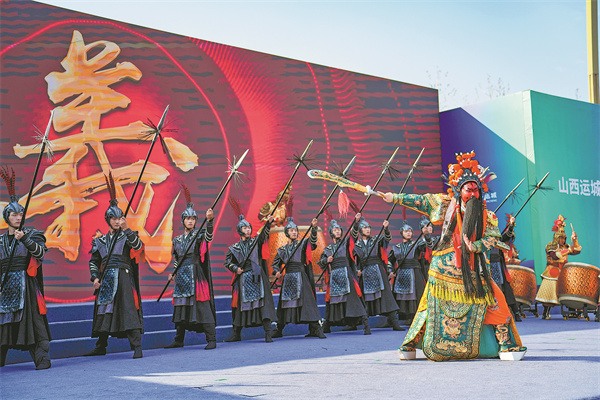
A local opera show featuring Guan Gong is staged during the 2024 festival. [Photo provided to China Daily]
For sightseers, early autumn is the best time to tour Yuncheng Salt Lake, one of the world's three most famous salt lakes with sodium sulfate, covering an area of 132 square kilometers. This lake is often referred to as the "Dead Sea of China", as the amount of salt allows people to float on it.
In summer and autumn, when the temperature rises and falls, different colors appear on the surface of the lake, making it resemble a huge painter's palette when viewed from a high vantage spot.
Autumn is also the time for rare migratory birds to begin to arrive at the lake. In 2014, local bird-watchers began to notice the arrival of several big pink birds, which were then identified as flamingos.
It was the first time that the beautiful and endangered birds had been found in China. Since then, flamingos have been spending winter at the lake.
"This means that Chinese bird lovers can have close contact with the rare birds on home soil, without going overseas," said Ma Hongyi, a local resident and an environmental protection volunteer near the lake. "This also shows the improvement of the environment at this ancient lake in Yuncheng with a history of more than 2.5 million years."
Li Yao contributed to this story.
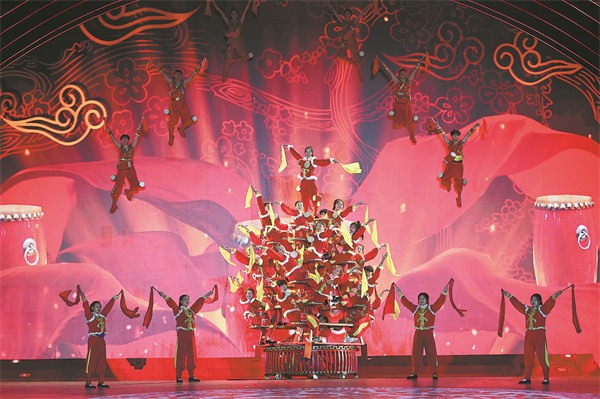
An acrobatic show is held during the festival in 2022. [Photo provided to China Daily]
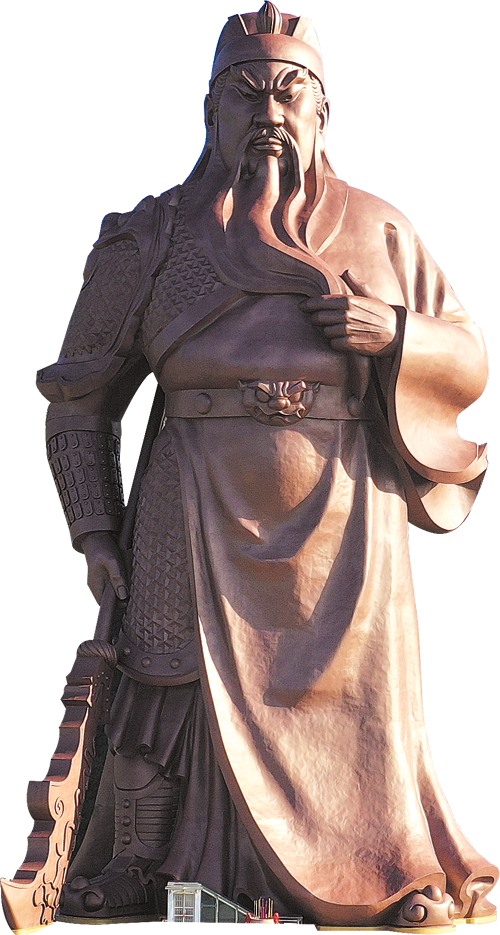
The Guan Gong statue in Haizhou township is the highest of its kind in the world. [Photo provided to China Daily]
 Editor:Qiu Xiaochen
Editor:Qiu Xiaochen